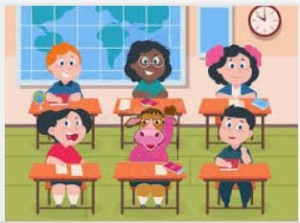In Taiwan, many names of places and people are Romanized using the Wade–Giles system, which spells the G sound as K. Therefore, 高 (Gāo), the last name of one of my classmates at an English-speaking girls high school is spelled as Kao. As our science teacher chose to address us by our last names, each time he called upon my friend to answer a question, all we heard was: “Miss Cow, Miss Cow!”
The Chinese generally respect oxen and cows as loyal and hard working beast of burdern. Many from the older generations refuse to eat beef for this reason. On the other hand, just like in western culture, oxen and cows are not considered intelligent animals. The Chinse word for “dumb ox” is 笨牛 (bèn niú). In the movie “The Butterfly Lovers”, when it finally dawned on the main male character that the “pal” he adored had been dropping hint after hint that she was actually a young lady disguised as a young man, he slapped his own forehead and exclaimed,
我是個大笨牛, 大笨牛!
Wǒ shì ge dà bèn niú, ge dà bèn niú!
I’m such a big fool, such a big fool!
Soon it will be 牛年 (niúnián), or Year of the Ox. Per the Chinese zodiac, people born in the Year of the Ox tend to be strong, diligent, reliable, faithful and patient. However, they can also be opinionated and stubborn, as indicated by the expression 牛脾气 (niúpíqi) representing bullheadedness, stubborn temperament or obstinacy.
牛 (niú) is a word radical that appears in many Chinese words, such as 物 (wù thing, matter, substance) or 牧 (mù to tend to a herd.) Can you find a few other words that take on this radical?
公牛 (gōngniú) is a bull or an ox. 母牛 (mǔniú) is a cow. 乳牛 (rǔniú) is a dairy cow. 水牛 (shuǐniú) is a water buffalo.
黄牛 (huángniú) is a yellowish brown ox usually employed in pulling carts. This word has a couple special connotations. As a noun, it could refer to a ticket scalper. In Taiwan, it can be used as a verb that means to fail to keep one’s word or to fail to show up.
好的, 你明天来接我; 不可以黄牛喔!
Hǎode, nǐ míngtiān lái jiē wǒ; bù kěyǐ huángniú ō!
All right, come tomorrow to pick me up; don’t weasel out!
犀牛 (xīniú) is a rhinoceros, and a tractor is referred to as 铁牛 (tiěniú iron ox).
蜗牛 (wōniú) is a snail. Do you think the head of a snail resemble that of an ox?
牛肉 (niúròu) is a general term for beef. 牛排 (niúpái) is a beefsteak, while 牛尾汤 (niúwěitāng) is an oxtail soup.
牛奶 (niúnǎi) is milk, and 酸牛奶 (suānniúnǎi) is yogurt or sour milk. Those of you with a sweet tooth should be interested to know that toffees are called 牛奶糖 (niúnǎitáng). 乳 (rǔ) is a more formal word for milk; it also refers to breasts. So, 牛乳 (niúrǔ) is cow milk, while 乳房 (rǔfáng) are breasts, and 乳癌 (rǔ ái) is breast cancer.
Butter is called 奶油 (nǎiyóu) in Taiwan, 牛油 (niúyóu) in Hong Kong, and 黃油 (huángyóu) in China. So, in Taiwan, cream is 鲜奶油 (xiǎn nǎiyóu), while elsewhere it is simply referred to as 奶油 (nǎiyóu). When working with a recipe in Chinese that includes butter or cream, make sure you know what is actually called for.
牛顿 (niúdùn) is the transliteration of the name of the physicist Sir Isaac Newton.
牛郎 (niúláng) the cowherd in the well-known legend “the Cowherd and the Weaver Girl”.
https://en.wikipedia.org/wiki/The_Cowherd_and_the_Weaver_Girl
牛仔 (niúzǎi) is a cowboy, and jeans are called 牛仔裤 (niúzǎikù).
牛痘 (niúdòu) refers to cowpox or small pox.
吹牛 (chuīniú) means to boast, brag, or talk big.
我哥哥最爱吹牛.
Wǒ gēgē zuì ài chuīniú.
My elder brother loves to brag.
牛饮 (niúyǐn) means to swig or to drink like a fish.
牛角尖 (niújiǎojiàn) is the tip of a ox horn. 钻牛角尖 (zuānniújiǎojiān) means to continue headstrong into a blind alley, or to split hairs to study an insignificant or insoluble problem.
我姐姐爱钻牛角尖.
Wǒ jiějie ài zuānniújiǎojiān.
My elder sister loves to split hairs on unimportant details.
牛马 (niúmǎ) are oxen and horses, i.e. beasts of burden. 做牛做马 (zuò niú zuò mǎ) means to toil like a slave.
父母甘心为子女做牛做马.
Fùmǔ gānxīn wèi zǐnǚ zuò niú zuò mǎ.
Parents are willing to toil for the sake of their children.
风马牛不相及 (fēngmǎniúbùxiāngjí) means having absolutely nothing to do with each other, such as two totally unrelated subject matters.
牛头不对马嘴 (niútóubùduìmǎzuǐ) translates to “The cow’s head does not match the horses’ mouth.” This expression is used to comment on an irrelevant answer received for a question asked.
杀鸡用牛刀 (shājīyòngniúdāo) means using an ox-cleaver to kill a chicken, i.e. breaking a butterfly on the wheel.
对牛弹琴 (duìniútánqín) literally means to play the lute to a cow. This idiom describes the situation in which one has choosen the wrong audience.
同他谈论艺术就像对牛弹琴.
Tóng tā tánlùn yìshù jiù xiàng duìniútánqín.
Discussing fine art with him is like casting pearls before a swine.
Given a choice, would you rather be the head of a small business or a peon in a large corporation?
宁为鸡首, 不为牛后.
Níng wèi jī shǒu, bù wéi niú hòu.
I would rather be the head of the chicken than the tail of a cow.
(I would rather be the leader of a small organization than a follower in a big organization.)
As you may already know, most Chinese refer to the Chinese Lunar New Year as 春节 (chūnjié), which translates to Spring Festival. However, it has nothing to do with the spring break observed at universities and schools. In Chinese, the spring vacation is called 春假 (chūnjià).
春节快乐!
Chūnjié kuàilè!
Happy Chinese Lunar New Year!

Recent Comments